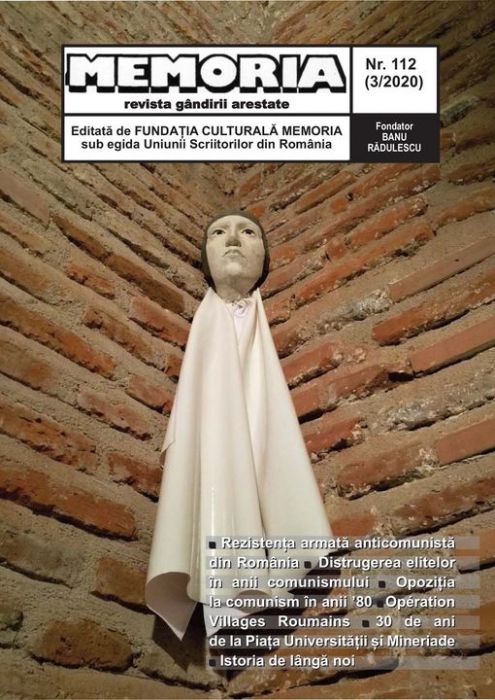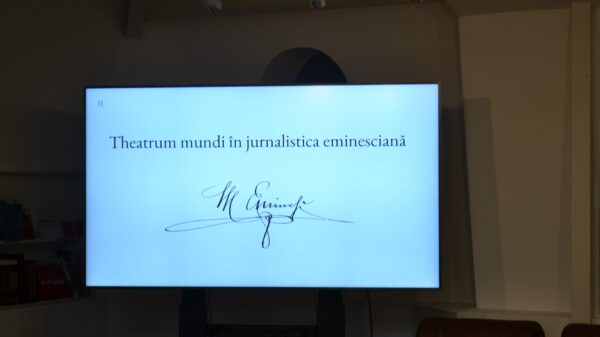Memoria – the magazine of arrested thinking has been published since November 1990 and is edited by the Memoria Cultural Foundation in Bucharest, Romania.
Banu Rădulescu, a former doctor and writer who was a political prisoner during the communist regime in Romania, came up with the idea for the magazine and later the Foundation.
Why Memoria? Because communism sought to assassinate the memory of the Romanian nation by all means. But the past must not be forgotten; that is precisely why the magazine is trying to revive, to reconstruct fragments of our country’s past, so sorely tried during the years of communism. It seeks to rescue from oblivion people and facts that help to understand the tragic history of the second half of the last century.
Why „the magazine of arrested thought”? Because the communist regime sought (and partly succeeded) in „arresting thought”, restricting freedom of expression, banning books and authors, cultural contacts, etc.
In 1989 the communist regime collapsed, and after years of totalitarianism, centralized press and censorship, the publishing market exploded. Most of the publications that appeared then proved short-lived, with only a few surviving to this day. Memoria is one of those that survived, perhaps because it was more than a publishing project from the start. The foundation on which Memoria was built was a very solid one, the aim being to pass on the consciousness of the struggle for freedom from the generations that suffered during the years of communism to future generations. Because during the 45 years of the communist regime in Romania, thousands of people were killed, hundreds of thousands ended up in prisons and camps, tens of thousands were deported, millions suffered to varying degrees. Beyond the physical repression of real, potential or imagined opponents, the communist regime also took measures in the area of culture and ideas. To counteract the effects of these concerted efforts to create a „new man”, the team behind Memoria magazine set out, among other things, „to restore the memory of this nation to its normal, physiological function. To make it breathe again, with its natural force, in the only climate that suits it, the climate of non-contradiction. Because many things can lie to us in life, but never the past”, as Banu Rădulescu said in the article that opened the first issue.
The need for such a project and its viability has been revealed over the years by the large number of articles signed by personalities from home and abroad, prominent names of civil society, former political prisoners, former deportees and prisoners of war, victims of the communist regime, citizens representing different socio-professional categories who lived under communism or young people born after 1990. At the same time, great visual artists and talented young people have contributed their works to illustrate and enrich the magazine. In terms of distribution, the magazine has also proved to be a success, with some of its copies crossing the country’s borders and reaching the farthest corners of the world, where Romanians live, some of whom have been in exile since the communist years. And even though they are physically far away, they have remained at home, in Romania. In a true spirit of freedom and tolerance, the covers of the magazine have been devoted to a wide variety of themes that have contributed to a better understanding of communist totalitarianism and the importance of freedom in the life and development of every human being.
As long as there has been no „trial of communism” in Romania, Memoria – the magazine of arrested thought has a special role and significance, being proof that the horrors of communism have not been forgotten, and that the memory of the victims of the totalitarian regime is preserved and will always endure in the hearts of the families, of the comrades in detention and suffering, of the descendants and in the very conscience of this nation. Thus the dark years of the gulags throughout the country will remain forever marked in the pages of the magazine.
„Memoria magazine appeared as a reaction to the continued silence of the authorities, as a posthumous homage to those who did not negotiate their principles of life, as a substitute for lame, incomplete or partisan contemporary history textbooks. This work of restoring memory has proved to be extremely necessary because the times we are talking about still have repercussions on Romanian society today. Thus, Memoria magazine has done its best to reconstruct the historical truth mistreated by Roller and his associates, people who did not feel and did not serve Romania and Romanians through their writings. The target group of the materials published in our journal are young people in search of the truth about contemporary history, but also historians and researchers, as well as all those who wish to fight against repression of any kind.”.This statement belongs to Mr. Nicolae Constantinescu, the current president of the Memoria Cultural Foundation and director of Memoria – the magazine of arrested thought.
Over the years Memoria – magazine of arrested thought has received several awards:
2020 – the „Iacob Negruzzi Iacob Negruzzi” Prize for the best literary magazine, awarded by Convorbiri Literare magazine.
in 2000 – „Honorary Member” of the Ministry of Interior „for the struggle in the service of justice and truth”;
also in 2000 – Diploma and Medal A Decade of Struggle for Democracy „in recognition of outstanding merits for the promotion of democracy and the rule of law in Romania”;
in 2010 – Ariel Award – Magazine of the Year 2009
also in 2010, an invitation to launch a special issue in French in Versailles on the occasion of the 20th anniversary of the publication;
in 2015 – Special Award of the Romanian PEN Center;
In 2020, on the 30th anniversary of the first issue of Memoria – the magazine of arrested thought, the Memoria Cultural Foundation initiated a Publication Contest on Communism. Prizes are awarded annually for works on the history of communism in Romania and other territories inhabited by Romanians – in the following categories:
o Memoria Cultural Foundation Prize – for the best scientific paper
o „Banu Rădulescu” Prize – for the best fiction book (novel, novella)
o „Micaela Ghițescu” Award – for the best memoirs
o „Cicerone Ionițoiu” Prize – for the best volume of studies
o Memoria Cultural Foundation Award – for the best collection of documents
o Memoria Cultural Foundation Award – for the best collection of oral history testimonies
SUMMARY SHEET
- Name:
Memoria Cultural Foundation - Address:
Calea Victoriei 133 A, sector 1, București; www.revistamemoria.ro, revistamemoria@gmail.com - Current leadership:
President: Nicolae Constantinescu, Vice President: Cosmin Budeancă, Executive Director: Oana Ichim - Brief history:
At the end of 1990 the first issue of Memoria – the magazine of arrested thought appeared, with Dr. Banu Rădulescu, a former political prisoner, as its founder, together with other former prisoners and opponents of communism. The aim of the periodical, as defined by the magazine’s founder, was „to restore the memory of this nation to its normal, physiological function. To make it breathe again, with its natural force, in the only climate that suits it, the climate of non-contradiction. For many things can lie to us in life, but never the past.” In order to ensure the publication of the magazine and to be able to carry out other projects, on 20 November 1991 the Memoria Cultural Foundation was founded as a non-governmental, non-profit organization whose mission was and still is to promote human rights, civic values and to restore the memory of times that still have repercussions on Romanian society today. - Objectives:
o To reveal the truth about the oppression to which our people, Romanian spirituality, was subjected, especially in the last half-century, especially during the communist regime
o Bringing back into the universal cultural circuit the works of the great Romanian cultural personalities who, throughout this period, were prevented, in various forms (through censorship, exile, deportation, arrest, physical extermination) from asserting their value;
o To inform society, especially young people, and the world at large that, despite the trials to which it has been subjected, Romanian spirituality has preserved intact its vitality and its belonging to European and universal culture. - Organization:
Non-governmental, non-profit organization - Publications:
Memoria – magazine of the arrested thought (quarterly publication, currently at number 127); volumes on topics related to the communist period, published by the Memoria Cultural Foundation Publishing House (over 85 titles to date). - Collaboration with other institutions:
Over the years, there have been collaborations with the Ministry of Culture and Religious Affairs, the Institute for the Investigation of the Crimes of Communism and the Memory of Romanian Exile, the Civic Academy Foundation, the Memorial to the Victims of Communism and Resistance, Sighetu Marmației, the Writers’ Union of Romania, Association of Former Political Prisoners in Romania, Corneliu Coposu Foundation, Radio Romania Cultural, Romanian Cultural Institute, Association of Former Political Prisoners in Romania, George Enescu Philharmonic, Association of the Memorial of the Revolution of December 16-22, 1989 in Timișoara, Museum of the Horrors of Communism in Romania.







